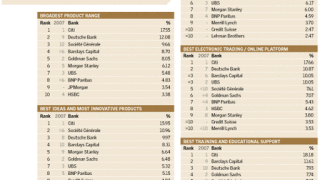EM Polls and Awards
-
The sub-prime fallout and global economic slowdown have made it more important than ever for banks to possess experienced and reliable private wealth managers to soothe the fears of their clients. As ASIAMONEY's largest private banking poll reveals, some have done a better job than others. Ruth David reports.
-
Even as Asia's financial markets grow, the region's banks and brokers are becoming increasingly sophisticated, and competitive. Add the volatile global markets so far this year, and the region's institutions are having to work much harder to stand out. ASIAMONEY reveals which financial houses are doing the best job.
-
A strong corporate vision and shrewd use of capital marked out the best companies and executive in the country. ASIAMONEY picks its top performers for 2007.
-
-
-
As uncertainty in the global market place persists, what is being done to keep the structured products business afloat, and how well is that working? Pamela Tang reports on a changing market, as ASIAMONEY reveals the winners of its largest structured products poll.
-
Ananth Doraswamy, head of commodities for Asia at Citi, moved to the region in November 2005 to grow the bank's commodities franchise. The fact that Citi has won the commodities-linked structured products poll in the three years since he arrived is a sure sign that his work has not gone to waste.
-
Since the credit crisis unfolded, the Asian investment grade universe has suffered in particular, with regional credit spreads widening more than their US and European peers. Such a drop is not justified as Asian fundamentals are more solid, argue private bankers, who point out that there haven't been any credit defaults in the Asian investment grade universe since 2004.
-
The foreign exchange business is all about breadth and bulk. It offers a natural advantage to banks with wide distribution capabilities in Asia and the world, and has led two global heavyweights to retain their dominance in this part of our polls.
-
It might be heady days for interest rates and currency products, but the same cannot be said for equity-linked structures. Demand for equity products has ground to a halt since highs in October, mirroring the fortunes of Asia's bourses. The Shanghai Composite Index in Shanghai closed at 3,116 points on April 21, 49% down from its 6,092 peak on October 16. Hong Kong's Hang Seng Index is similarly bruised, falling 22% from its peak of 31,958 on October 30 to 24,721 on the same day.
-
While equity products have become an unwelcome concept, it has been completely different for interest-rate-linked counterparts. Investors are keen to take advantage of the steepening interest rate curves across much of the world.

